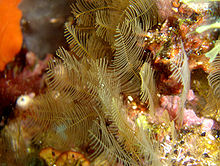Plumularioidea
| Plumularioidea | |
|---|---|

| |
| Aglaophenia species (Aglaopheniidae) | |
| Scientific classification | |
| Kingdom: | Animalia |
| Phylum: | Cnidaria |
| Class: | Hydrozoa |
| Order: | Leptothecata |
| Superfamily: | Plumularioidea McCrady, 1859 |
Plumularioidea is a superfamily of hydrozoans in the order Leptothecata.
This superfamily unites about 45 genera in the following families:[1]
- Aglaopheniidae Marktanner-Turneretscher, 1890
- Halopterididae Millard, 1962
- Kirchenpaueriidae Stechow, 1921
- Phylactothecidae Stechow, 1921
- Plumaleciidae Choong & Calder, 2018
- Plumulariidae McCrady, 1859
- Schizotrichidae Peña Cantero, Sentandreu & Latorre, 2010
These thecate hydroids grow in erect colonies, branched in some species but unbranched in others. Each branch may bear a single or several animals. In the latter case the hydrothecae are arranged in a neat single file; in either case they are not set on stalks but grow from the branches directly. The hydrothecase have a cusped or even rim and instead of a diaphragm a well-defined floor with a that is usually off-center. The hydranths have a conical hypostome and a single whorl of thread-like tentacles. The gastrodermis contains areas with and others without digestive function. are always present and usually protected by . The gonotheca are borne singly or in groups, they may or may not have protective or appendages. The gonophores are usually fixed sporosacs, more rarely they are rather reduced medusoids.[2]
Footnotes[]
- ^ "WoRMS - World Register of Marine Species - Plumularioidea McCrady, 1859". marinespecies.org. Retrieved 2018-03-16.
- ^ Schuchert (2008)
References[]
- Schuchert, Peter (2008): The Hydrozoa Directory - Suborder Conica Broch, 1910. Retrieved 2008-JUL-08.
- Plumularioidea
- Leptothecata
- Animal superfamilies
- Leptothecata stubs